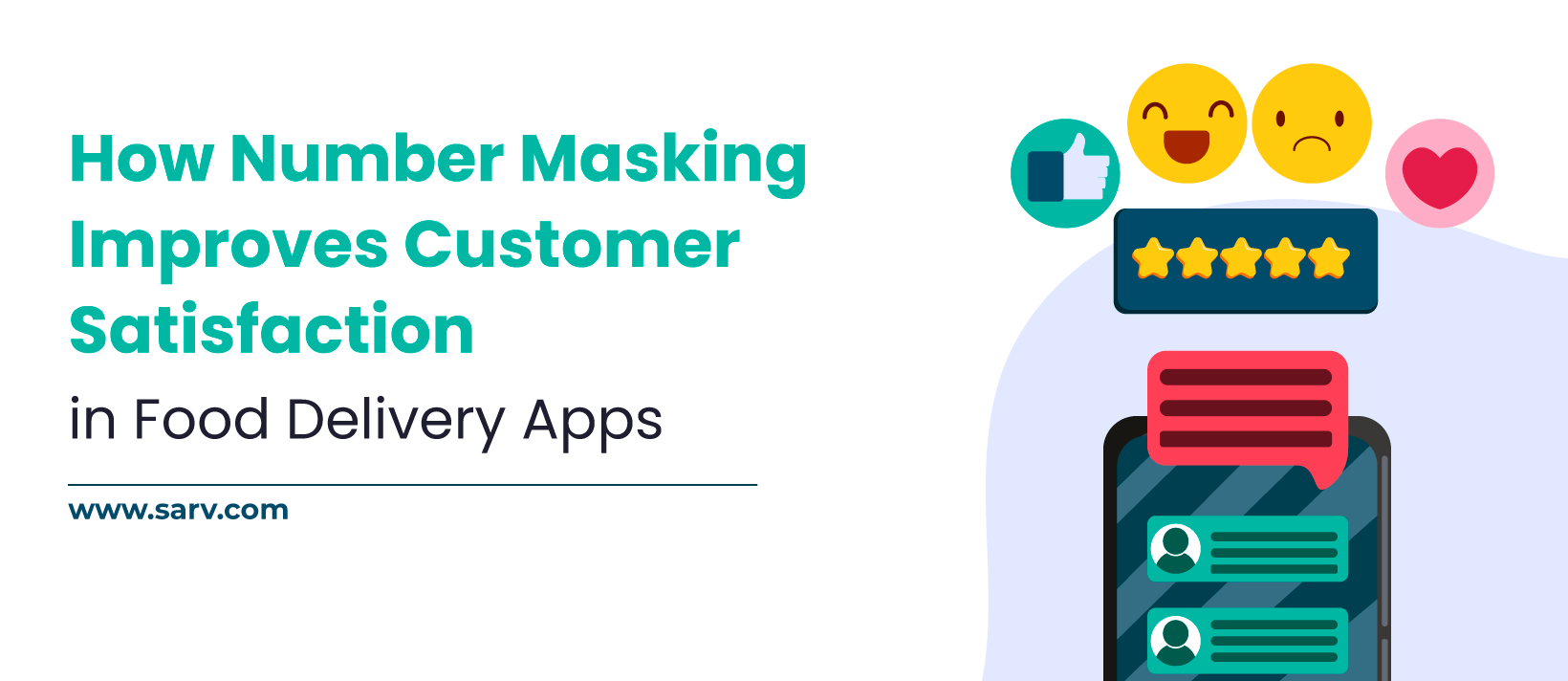
How Number Masking Improves Customer Satisfaction in Food Delivery Apps
- Read Time: 3 Min
In today’s fast-paced world, food delivery apps have become a vital part of our lives, bridging the gap between hungry customers and their favorite meals.
While convenience and speed are key drivers of these platforms’ success, customer satisfaction remains the most important for their growth.
One advanced feature that significantly enhances user experience is number masking—a technology designed to ensure secure communication between customers and delivery personnel.
By implementing masked phone numbers, food delivery apps are revolutionizing how privacy and convenience are managed in the digital era.
What is Number Masking?
Number masking, also known as call masking, is a privacy-focused feature that conceals the real phone numbers of customers and delivery personnel during communication.
Instead of displaying the actual phone number, a temporary or virtual number acts as an intermediary. This ensures that both parties can interact without exposing their personal contact information.
Major food delivery apps such as Zomato and Swiggy widely use this feature, and for a good reason—it provides a secure, seamless, and satisfying experience for everyone involved.
The Role of Number Masking in Customer Satisfaction
1. Enhanced Privacy Protection
Privacy concerns are one of the leading factors that influence a customer’s trust in digital services. With number masking, customers no longer have to worry about their phone numbers being misused by delivery personnel.
Similarly, delivery agents are safeguarded against potential harassment or unsolicited calls. By masking phone numbers, food delivery apps ensure both parties feel secure, which directly translates to improved customer satisfaction.
2. Improved Professionalism
Masked phone numbers create a professional boundary between customers and delivery agents. Without the exchange of personal contact details, interactions are limited to the delivery process, maintaining a clear line between personal and professional spaces. This not only prevents unnecessary disputes but also fosters a sense of trust and reliability.
3. Seamless Communication
One of the misconceptions about number masking is that it complicates communication. On the contrary, it provides a smooth experience.
Customers and delivery agents can make or receive calls as needed, without even realizing that their real numbers are hidden. This balance between privacy and convenience ensures that the overall user experience is not compromised.
Why Masking Phone Numbers is a Must-Have for Food Delivery Apps
1. Strengthening Brand Trust
In an age where data breaches and privacy violations make headlines, apps that prioritize user privacy stand out. Food delivery platforms demonstrate their commitment to customer safety by adopting masked phone numbers. This builds trust, encouraging more users to engage with the platform.
2. Compliance with Data Privacy Regulations
Data protection laws, such as GDPR (General Data Protection Regulation), require businesses to safeguard user information. Number masking ensures compliance with these regulations, protecting apps from hefty fines while reassuring customers about their privacy.
3. Reducing Conflict and Misuse
Unwanted interactions between customers and delivery personnel can lead to conflicts, poor reviews, and even legal challenges. By eliminating the exchange of personal numbers, number masking minimizes such risks, creating a safer environment for all users.
How Number Masking Works
The process of masking phone numbers in food delivery apps involves integrating a virtual telephony system. Here’s how it typically works:
- When a customer places an order, a unique virtual phone number is generated for communication.
- Both the customer and the delivery agent use this virtual number to interact.
- Once the order is completed, the virtual number becomes inactive, ensuring no further communication can take place.
This simple yet effective technology ensures that neither party’s personal information is exposed at any stage of the interaction.
The Business Benefits of Masking Phone Numbers
Beyond customer satisfaction, number masking provides tangible advantages for food delivery apps:
1. Cost Efficiency
Although it involves an upfront investment, virtual number technology can reduce customer service costs in the long run. By minimizing disputes and complaints, apps can allocate resources more effectively.
2. Scalable Solution
Whether your app handles hundreds or millions of orders, number masking is a scalable solution that grows with your business. It can be seamlessly integrated with other communication systems to enhance operational efficiency.
3. Competitive Edge
As competition in the food delivery market intensifies, offering robust privacy measures like masked phone numbers sets an app apart. Customers are more likely to choose a platform that prioritizes their security and privacy.
The Future of Number Masking in Food Delivery
With advancements in technology, the scope of number masking is expanding. Food delivery apps are exploring ways to enhance this feature further, integrating AI and machine learning for smarter, more personalized communication. For instance, automated systems can filter inappropriate messages or calls, adding another layer of protection.
As more users demand transparency and privacy, number masking will continue to play a pivotal role in shaping the future of food delivery apps.
Conclusion
In the competitive world of food delivery, customer satisfaction is key to success. Number masking has emerged as a game-changing feature that addresses privacy concerns, enhances professionalism, and ensures seamless communication.
By masking phone numbers, food delivery apps not only protect their users but also foster trust, build brand loyalty, and stay compliant with privacy regulations.
As privacy becomes an increasingly critical aspect of user experience, investing in number masking is no longer an option—it’s a necessity. Food delivery platforms that embrace this technology are not just securing their customers; they’re paving the way for a safer, more reliable digital ecosystem.